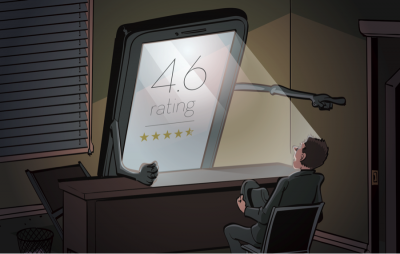
If you spend enough time in San Francisco, you’ll notice sharing economy workers everywhere. While you’re waiting to get some food, look for the most frantic person in the lineup and you can bet they’re working with an app. Some of them are colour-coded: workers in orange T-shirts are with Caviar, a food delivery app; those in green represent Instacart, an app for delivering groceries. The blue jackets riding Razor scooters are with Luxe—if you’re still driving yourself around this city, these app workers will park your car.
In the Bay Area, there are thousands of such people running through the aisles, fidgeting in line and racing against the clock. They spend most of their time in cars, where it can be harder to spot them. Oftentimes they’re double-parked in the bike lane, picking up a burrito from inside an adjacent restaurant or waiting for a passenger to come down from the apartment on top. If you look closely, you’ll see a placard in the window that says Uber or a glowing pink moustache indicating they drive around Lyft’s passengers. Last summer, I was one of them.
Oh, Canada! I’m writing you from Berkeley, California to warn you about this thing called “the sharing economy.” Since no one is really sharing anything, many of us prefer the term “the exploitation economy,” but due to its prevalence many in the Bay Area simply think of it as “the economy.” Whatever you want to call it, the basic idea is that customers can outsource all the work or chores they don’t want to do to somebody else in their area.
You can be chauffeured around the city while somebody picks up and launders your dirty underwear. You can have groceries delivered to your door and your bathroom given that deep clean that you don’t have time to do yourself. The best part is you can do it all on your phone! Sharing economy companies promise their customers all the luxuries of the rich and famous—and they can do that by taking advantage of the system and, in some cases, bending or simply avoiding labour laws.
Read the full article at the Canadian Centre for Policy Alternatives
Go to the GEO front page

Add new comment